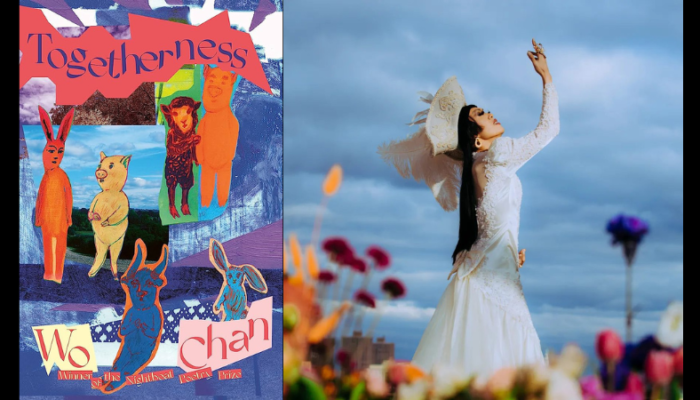Chaya fell silent when her mother died. After the funeral and the grimaced smiles and convoluted paperwork, Chaya walked to the market and bought a handful of okra. She used her pointer finger to speak. She was tired of the noisy words. She returned to her apartment at the edge of the city and buried herself under a sea of white blankets. After a restless, dreamless sleep, Chaya crawled out from under the blankets and emerged into the living room. By the window, a gleaming easel had appeared along with a blank canvas that stared directly at her. Chaya moved hypnotically towards it, picking up the wide paintbrush on the easel. She brushed it, bare, across the canvas. She then dipped the brush in the pool of dark paint that bloomed on the coffee table, and brought it back to the canvas, and a picture started to emerge.
She would make a portrait of her mother shrouded in darkness, holding a clay oil lamp. When Chaya closed her eyes she could see the full image, the jellyfish-like light patterning the space around her mother’s head, her free arm reaching out, as if to Chaya beyond the frame. In her vision, her mother’s hand covered Chaya’s face, blocking any sound from coming out.
Each morning she woke and stood by the canvas, and her hand seemed to know how to curve, to contort, to move the picture from her mind onto the page. She took short breaks only to pace fourteen times around the easel, return circulation to her legs, or eat steaming dal and rice cross-legged on the floor. Large peppercorns swam whole in the dal soup, and they lodged in her throat, and she would cough, angry not that she was coughing but that the whole ordeal was taking her away from her painting.
Before he went off to work at the local bank, Chaya’s husband would wave her goodbye, asking no questions about her silence. Chaya assumed that he welcomed it—the silence—because it meant she bothered him less with details of her day and queries about his. Before her silence, Chaya noted his noncommittal grunts and nods in response to her recounting her walks around the neighborhood, the sunbirds she saw flocking around the pond like moths to light. She watched him take out his cigar as she was speaking and step out onto the porch, smoke slithering from between his lips. He fiddled with his phone. She assumed he’d been sleeping with Jaya, a coworker, for some time now. It no longer caused her pain—the image of them entangled—Rajiv swirling his tongue around Jaya’s nipples, her moaning in pleasure. Rather, when such images intruded, she waved them away, irritated by the distraction from her painting, from the recreation of her mother.
After Rajiv left, she could embed herself deeply into the portrait, rendering the gold embroidery of her mother’s sari, the copper-like hue of the lamplight spreading thickly over the dark. As she painted each detail, a fold in the sari, the shape of her mother’s eyelids, memories returned to her. Her mother sitting on the porch steps in their red house in Bangalore, hands placed over her knees, watching the neighbor’s dog twist endlessly in a patch of sun. Standing in the doorway to the kitchen, silent as young Chaya stood before her, urging her to speak, to tell her father it wasn’t fair he wasn’t letting Chaya play with her friend. Girls, he said, shouldn’t let themselves loose in the world. Pursing her lips, knitting in the bedroom as Chaya’s father stood outside, hurling insults like tiny knives. Why won’t you speak! Chaya had yelled in frustration, and her mother stared at her with a tiny, lopsided smile, eyes stoic and shining, and now in the renewed clarity of memory Chaya recognized the hurt that glistened in her mother’s eyes then, in her woven-together lips sealed shut so the world would never hear the lilt of the syllables caught in her mouth.
Twenty-seven days after she began the portrait, Chaya finished. A shock ran through her spine one morning, when she saw that she needed just one more brush of gold on her mother’s forehead. She pulled the brush across her mother’s skin until it glistened, then Chaya fell back, dropping her paintbrush on the floor, and the clattering sound rippled across her face and ears, and her mother loomed large in front of her, full of flesh and golden light, and still her mother stood distant, still she moved away, until her eyes softened and she welcomed Chaya into her arms and in the wake of the embrace Chaya touched her mother’s mouth, and then it all fell out, all the words she’d kept inside, all she’d never been able to tell her, and as the words fell to the ground they shimmered like light, quick bells, growing faster until they surrounded her, making a song only Chaya could hear, a song that had lived starving inside her mother so long.




